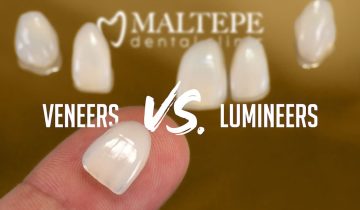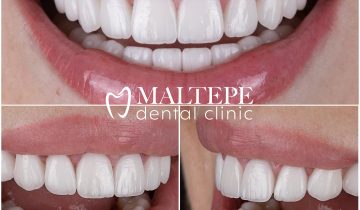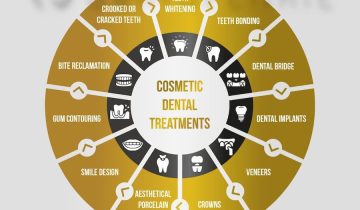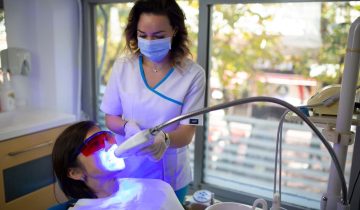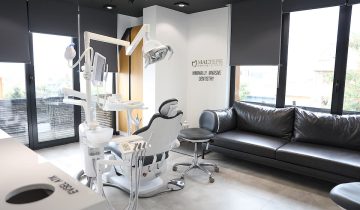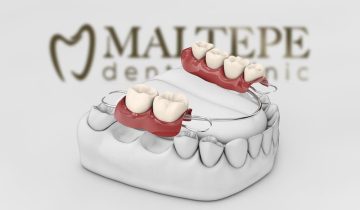Last updated on October 18th, 2023
Dentures are prosthetic dental devices used for replacing missing teeth. They can be removable or permanent depending on the type. There are many types of dentures including full dentures, partial dentures, overdentures…etc.
In this post, you will read about the different kinds of dentures, as well as find answers to several questions that patients often have about dentures. You might have an idea which denture is right for you as you read through the article, but we still strongly recommend you to do your research, in addition to talking to your dentist to get the best results for you.
What Are The Different Types Of Dentures?
Here are the most common denture types that dental professionals use in treatments.
- Full denture
- Partial denture
- Immediate (or temporary) denture
- Overdenture
- Implant-supported denture
- Snap-In denture
- Flexible denture
- Cu-Sil denture
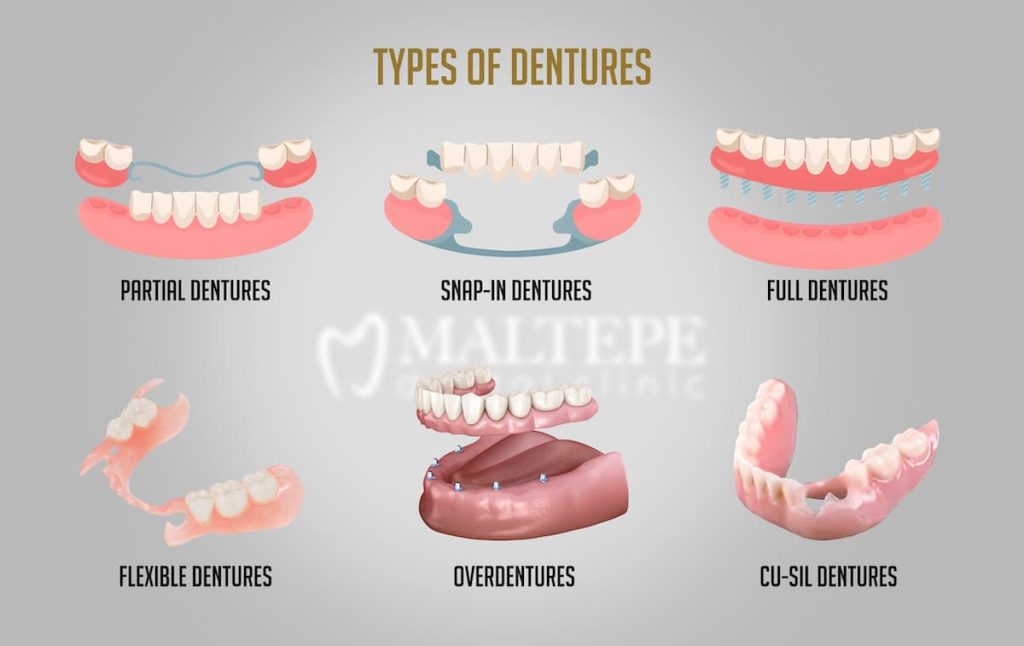
Full Dentures
Full dentures replace all the natural teeth in patients’ upper or lower jaw by resting on the gum tissue. You can find conventional and immediate full dentures made of acrylic resin.
Full dentures are cost-effective and useful as they improve self-confidence by restoring eating and chewing. However, they might cause a lisp, or they can slip out when speaking and eating. Thus, patients should be careful when using them.
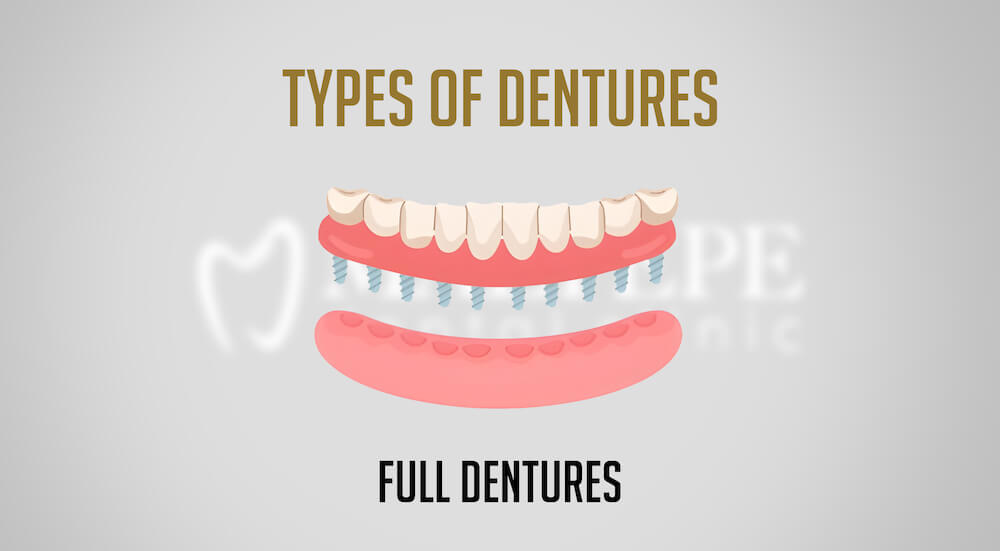
Partial Dentures
Partial dentures are artificial teeth that are used to replace missing teeth. Partial dentures can be used with upper or lower teeth as they only cover some parts of the jaw. Dentists often use a plastic base that color matches the natural gums, and a metal frame to hold the denture, base, and gum tissue in place.
Partial dentures can be removable or fixed, and they offer an affordable means of treatment. However, they might cause discomfort or damage to adjacent teeth or gums.
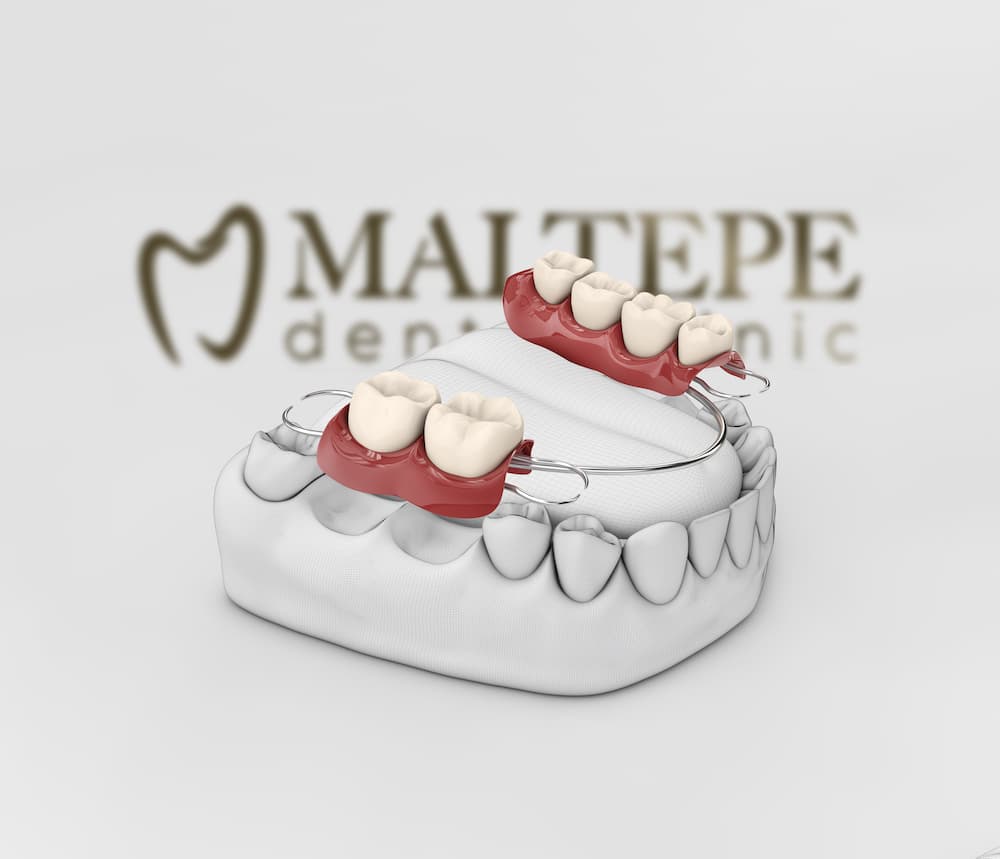
Immediate (Or Temporary) Dentures
Temporary dentures are made ready before a tooth extraction, and placed in the mouth to protect the surgery area right after the extraction. Immediate dentures allow patients to eat and speak normally after a tooth extraction, and they offer a more comfortable and safe healing period.
Immediate dentures are great as patients wear them and they don’t feel embarrassed after losing a tooth or several teeth. They can smile, speak, and eat comfortably right away. The only drawback is that temporary dentures are usually harder to fit properly since gum tissue shrinks after the surgery.
Overdentures
Overdentures are a type of denture placed over partially existing natural teeth or implants. They can be removable or fixed, but either way, they fit better since they are supported by natural teeth or dental implants.
Overdentures are functional as they protect the natural teeth and bone structure, and improve chewing performance and speaking with minimal discomfort. Overdentures slows the loss of jawbone that occurs when teeth are missing. Overdentures also provide support for lips and cheeks for an attractive appearance. Having said that, overdentures require the same care as natural teeth and need regular maintenance. They are also relatively more expensive than traditional dentures.
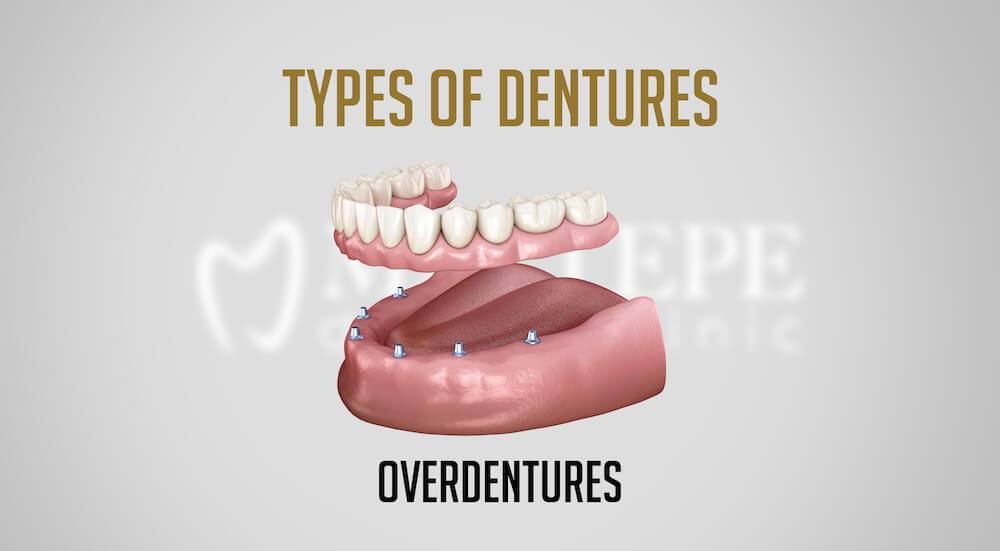
Implant-Supported Dentures
Implant-supported dentures are artificial teeth attached to implant posts. As the name suggests, the patient needs to have an implant surgery before denture placement. Since the metal posts firmly support the dentures, implant-supported dentures feel more comfortable. They are available in both fixed and removable options. The removable kind of implant-supported dentures are also called Snap-in dentures.
Implant-supported dentures are perfect in terms of stability and security. They don’t slip while eating or speaking. They also prevent bone loss while preserving the facial structure. However, it is worth noting that implant-supported dentures require implant surgery, and they are usually more expensive than other types of dentures.
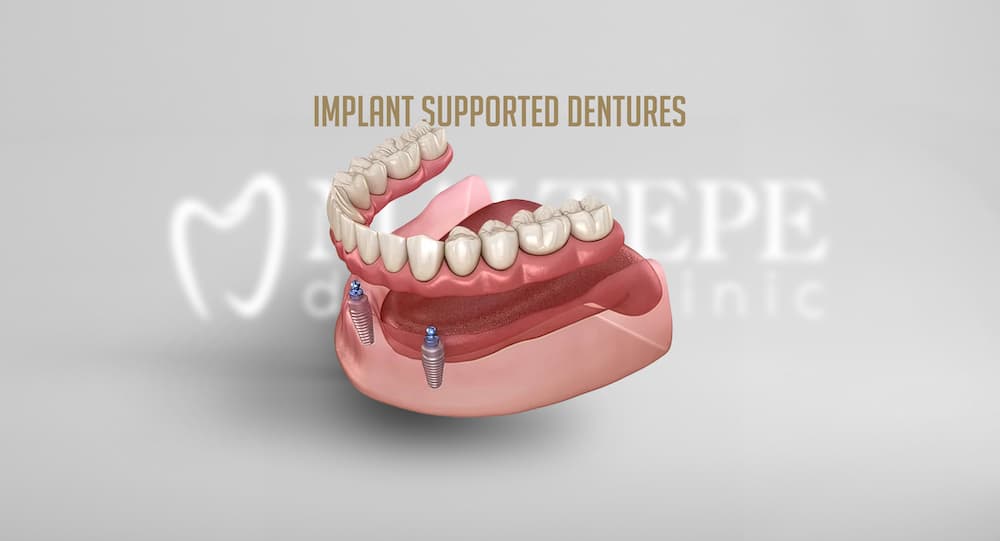
Snap-In Dentures
Snap-in dentures are removable implant-supported dentures. They have clips that attach to the implant abutments. Some snap-in dentures are ball retained, and some are bar-retained. They offer enhanced stability while also being removable.
Snap-in dentures offer the convenience of stability and removability simultaneously. They are easy to clean, and dentists can easily take them out to reach the implants when necessary. On the other hand, snapping them on and off repeatedly might wear them out sooner than traditional dentures.
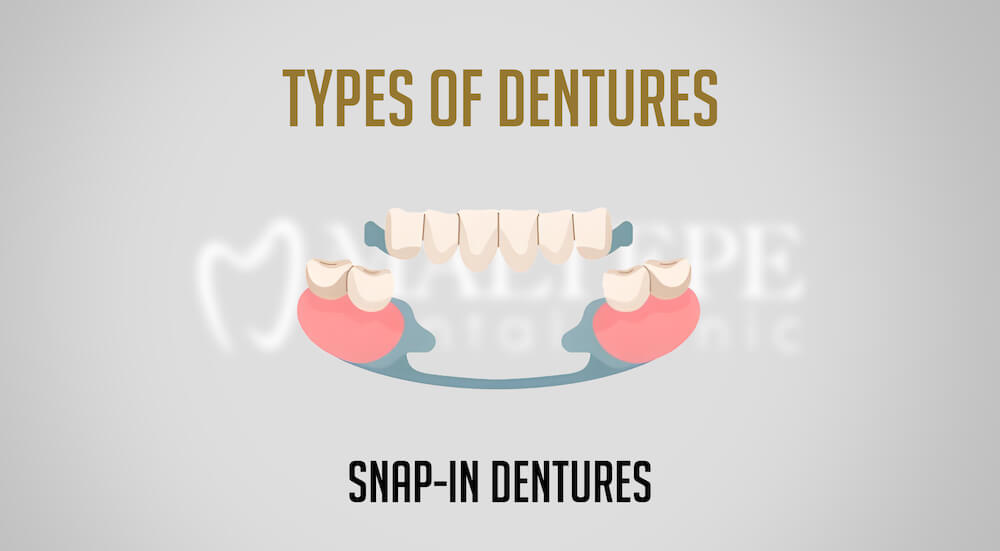
Flexible Dentures
Flexible dentures are made of thermoplastic materials. They are placed on the gum without any attachments or metal clasps. They take the shape of the mouth and will bend accordingly.
Flexible dentures look more natural than other rigid denture types, they protect allergy-prone patients from metal sensitivity issues. Since they are softer, they do not damage the adjacent teeth or gum tissue. However, they are prone to staining and discoloration. Also, chewing hard foods can be difficult with flexible dentures.
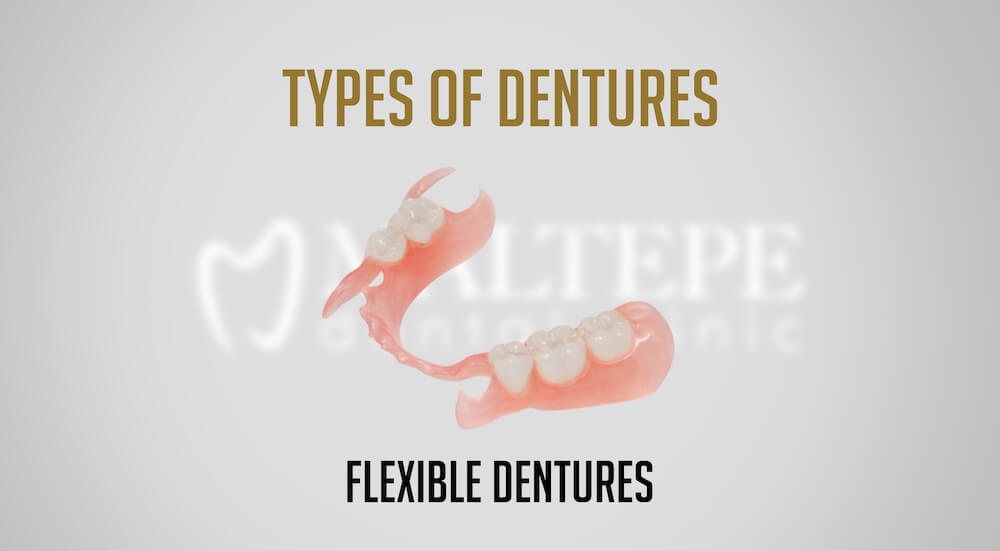
Cu-Sil Dentures
Cu-Sil dentures are a type of partial denture that replaces missing teeth which have holes allowing for the remaining natural teeth to poke through. The holes form a seal around the natural teeth which helps the denture keep its position.
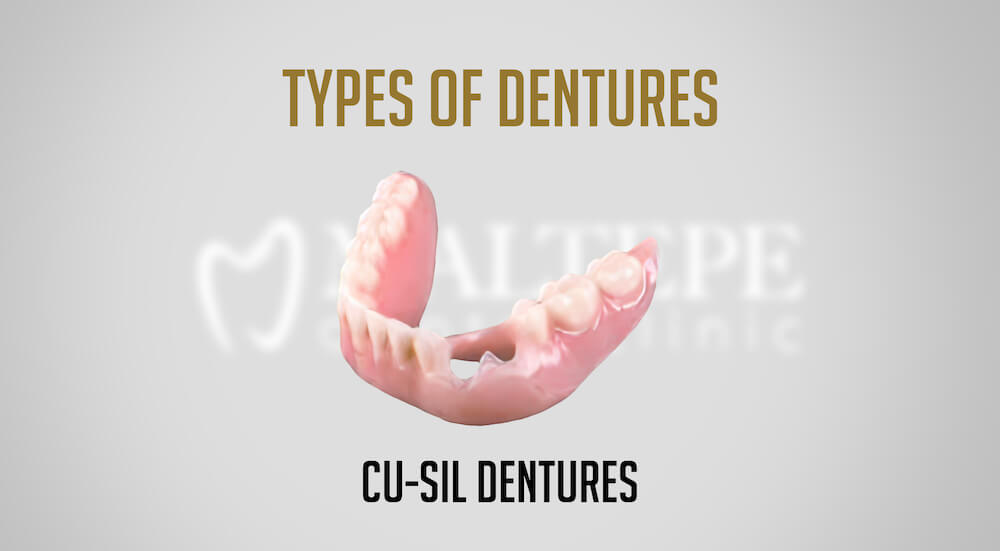
Cu-Sil dentures are perfect for those concerned about remaining healthy teeth by letting them show. They also tend to look more natural and provide higher stability for patients who still have some healthy teeth remaining. However, plaque accumulation around the natural teeth can be a serious problem leading to tooth decay or gum diseases. Therefore, practicing proper oral hygiene is extremely important for patients.
The best type of denture for you will depend on your individual needs and preferences. Your dentist can help you decide which type of denture is right for you. In this video, Dr. John Jazayeri explains different types of dentures.
How to Care Dentures?
To care for your dentures properly, The American College of Prosthodontists (ACP) recommends the following:
- Soak and brush dentures with an effective, nonabrasive denture cleanser.
- Do not use toothpaste, as it can be abrasive and damage the dentures.
- Rinse dentures thoroughly after cleaning.
- Remove your dentures after eating and brushing your teeth.
- Rinse your dentures with water before brushing them.
- Brush your dentures with a soft-bristled toothbrush and a nonabrasive denture cleanser.
- Soak your dentures in water or a denture-soaking solution overnight.
- Annual cleaning of dentures by a dentist or dental professional can help to remove plaque and bacteria that may build up over time.
- Avoid placing dentures in boiling water or sodium hypochlorite bleach.
- Storing dentures in water when not in use will help to prevent them from warping.
- Use denture adhesives as directed. Denture adhesives can help to improve the fit and stability of dentures.
- Do not use denture adhesives if you have any gum irritation or sores.
- Do not use too much adhesive, as this can be harmful to the gums.
- See your dentist or dental professional for regular checkups. This will help to ensure that your dentures are fitting properly and that your gums are healthy.
When to See Your Dentist for Denture Replacement?
According to ADA, American Dental Association, you should see your dentist to get your dentures replaced if:
- You are suffering from chronic irritation or inflammation beneath the denture.
- You cannot wear your removable denture anyway.
- Your denture is not stable, or it needs adhesive more than usual during the day.
- Your denture is discolored, cracked, broken, or misaligned.
- Your teeth supporting the removable denture are undergoing any change.
- 5 years have passed since the fabrication of the denture.
FAQs about Dentures
How Long Does It Take To Get Used To Dentures?
It takes between 4 weeks to 8 weeks to get used to dentures.
How Long Do Dentures Last?
Dentures can last for up to 10 years, but you should get checkups after 5 years of their fabrication according to American Dental Association.
What Type Of Dentist Does Dentures?
A prosthodontist does dentures. However, general dentists can apply immediate denture type.
What Type Of Dentures Are The Best?
The best type of dentures depends on several factors including your oral health, budget, lifestyle, other health conditions…etc.
What Are The Most Comfortable Dentures To Wear?
Flexible dentures are the most comfortable denture types for many people as they don’t damage the gum tissue, which means less discomfort and irritation. Manufacturers use the latest technology for dentures, and flexible dentures are a good example of the advances made.
What Is The Most Recent Denture Technology?
The digital denture is the latest technology in denture design and fabrication. They utilize dental technology such as CAD/CAM to make the perfect dentures for patients.
What Type Of Dentures Are Most Natural Looking
Flexible dentures provide the most natural look because of their translucent design.
How Should I Chew with Dentures?
You should chew on both sides. This will help distribute the chewing pressure evenly and prevent your dentures from slipping.
What Are Dentures Made From?
Dentures are made of acrylic or porcelain.
Do Dentures Affect Your Speech?
Yes, dentures can affect your speech. You might have difficulty pronouncing certain sounds or words.
What Are The Alternatives To Dentures
Dental implants are the most common alternatives to dentures.

